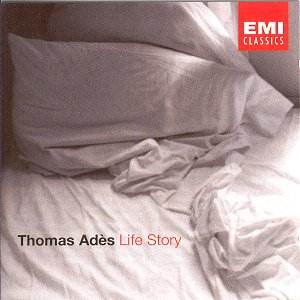 |
LIFE STORY Thomas ADÈS (born 1971) Catch, Op. 4adef. Darknesse Visiblea. Still Sorrowing, Op. 7a. Under Hamelin Hill, Op. 6g. Five Eliot Landscapes, Op. 1ab. Traced Overhead, Op. 15a. Life Story, Op. 8a Recorded in Air Studios, London (Under Hamelin Hill) in May 1996 and No. 1 Studio, Abbey Road in February-April 1996 (other works). [DDD] Crotchet AmazonUK AmazonUS Amazon recommendations |
Originally issued in May 1997 and one of the clear successes of EMI's Debut series, this disc was a major contributory factor to Adès' success. It is still difficult to believe that Adès was born as recently as 1971, such is the sureness of the compositional hand at work in these pieces. Since then awards and commissions have followed each other in bullet-like succession (he was the youngest ever recipient of the Grawemeyer Prize for his orchestral work Asyla, Op. 17, for example). He has acted as the Hallé's Composer-in-Residence (which in fact resulted in Asyla, as well as The Origin of the Harp) and he has produced an opera, Powder her Face, of international significance. In addition, he has let his talents as pianist and conductor develop (his solo piano disc on CDC5 57051-2 is an impressive achievement review).
Being in possession of such enviable pianistic gifts makes Adès the ideal interpreter of his own piano music. He makes the complexities of Traced Overhead (1996) seem easy (other pianists performances reveal this clearly not to be the case). Darknesse Visible, a 'recomposing' of Dowland's In darknesse let me dwell, likewise exhibits an astonishing variety of textures.
If I have a problem with hitching a lift on the Adès bandwagon, it is that, despite his incredible aural imagination, his works need to come that bit more into focus. They can appear somewhat diffuse, despite their obvious compositional virtuosity. This is not to say that the sonic vocabulary he draws on is mere surface tracery, however: every single piece on this disc invites the listener to delve deeper on each repeated hearing. It is like looking at a fascinating, yet still somewhat imperfect, diamond.
Catch (dating from 1991), the first work on the disc, exemplifies many characteristics of Adès' music. There is an omnipresent energy which, when not explicit, bubbles constantly below the surface. It is almost as if there are too many ideas bursting to get out, and Adès feels they must somehow be crammed into ten minutes. Abrupt juxtapositions of material, texture and tempo make for a heady ride. Catch has a musico-dramatic element best seen and heard (if you'll pardon the pun): a clarinet is lured on to the stage by the other instruments, slowly but surely, until only at the end does it take its place with the other instruments.
It hardly comes as a surprise that the capabilities of the modern piano are not enough for Adès. The Cage-like additions that characterise the sound-world of Still Sorrowing (Blu-tac, in this instance) introduce yet further variety of timbre, almost otherworldly in effect. The black, half-lit world of Under Hamelin Hill is made even more unsettling by the choice of the chamber organ, an instrument which in Adès' hands seems to be a shadow (or memory) of some larger entity.
The final piece on the disc, Life Story of 1993 (here for soprano and piano: there is also a version for soprano and small chamber ensemble) gives testament to Adès' sure sense of the dramatic. Mary Carewe is superbly gripping in her Billie Holiday-like bluesiness, narrating the tale and projecting its unsettled undercurrent. The seediness of the situation (the aftermath of a one-night stand) is tellingly portrayed.
In short, there is plenty to provoke thought here, and much to make one wonder in which this direction this composer will travel in the future.
Colin Clarke